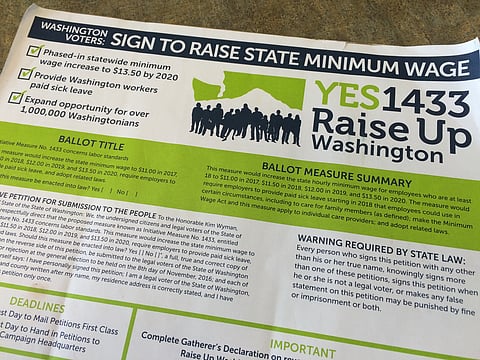Raising Wages Statewide Is a Job for We the People
by Marilyn Watkins
Over the next couple weeks, young people across the region will be graduating with new degrees and high hopes for the future. They are competing for jobs in an economy where the contrast between the the haves and have nots is stark.
The occupations projected to have the most job openings in King County and statewide over the next five years include computer-related and business jobs that usually come with high pay and full benefit packages. But the top ten list also includes positions in fast food, restaurants, retail sales, and office administration, where current wages are barely enough to support a single person, let alone a family, even outside the greater Seattle area.
Not everyone can or should end up a software engineer. We need people working in restaurants, groceries, childcare, health care, and social work, too. And those jobs should not trap tens of thousands of workers and their children in poverty and constant struggle.
By enacting paid sick days and a higher minimum wage, Seattle has started on the right path toward ensuring every job provides a pathway to opportunity and supports a thriving economy. But not every job is in Seattle. Statewide progress on these same policies has stalled year after year in our divided State Legislature.
The Raise Up Washington campaign is now collecting signatures to qualify Initiative 1433 for the November ballot. I-1433 will raise Washington's minimum wage from the current $9.47 to $11.00 starting in January 2017, then raise it in three further steps to $13.50 in 2020, with cost of living increases after that. Importantly, it also sets a minimum standard for paid sick leave, assuring that all workers across the state are able to earn at least an hour of sick leave for every 40 hours worked.
For people now working at or near minimum wage in Renton, Southcenter Mall, or Yakima, that means an immediate pay increase of $250 a month, and an increase of $650 in monthly income by 2020. That money will get spent right in local communities. The initiative also means that a million people who don't have sick leave now — many of them working in restaurants, retail, and other direct service occupations — will have the ability to stay home when sick or with a sick child without losing their paycheck.
We know from studying dozens of minimum wage increases and sick leave laws across the country that these policies succeed in boosting incomes for low wage workers, decreasing employee turnover, and allowing businesses of all sizes to continue to prosper.
Over the past few decades across the U.S., wealth has piled up for the top 1%. The top 10% has also done pretty well, but incomes for most working people have stagnated or even fallen. Here in Washington between 2010 and 2014, during the so-called economic recovery, the annual wages for full-time workers in the middle of the earnings spectrum actually fell by 3% after inflation, according to the Census Bureau. Meanwhile, costs for childcare, college tuition, healthcare, and housing continue to escalate.
Growing economic inequality compounds racial and gender inequities and deepens divisions in our society and democracy. We all lose — with less innovation, economic vibrancy, and cultural richness — when so many are denied the opportunity to reach their full potential and pursue their dreams.
It doesn't have to be this way. We the people make the rules for our economy. Usually it's through our votes for President, Congress, Governor, and state Legislature. With the contrasts in ideology and policy positions up and down the ticket so stark, those votes will matter more than ever this fall.
The initiative process also lets us act directly. I-1433 won't reverse decades of economic policies that have driven growing income inequality, but it's a step toward making our state economy work better for everyone.
We don't have to wait until November to act. The Raise Up Washington campaign needs to collect 246,000 valid signatures from registered Washington voters by the beginning of July to qualify for the November ballot.
You can help right now by signing yourself, registering to vote if you haven't already, and volunteering for the campaign.
Marilyn Watkins is policy director of the Economic Opportunity Institute, a nonpartisan policy center focused on building and economy that works for everyone.
Featured image courtesy of Economic Opportunity Institute
Help keep BIPOC-led, community-powered journalism free — become a Rainmaker today.


